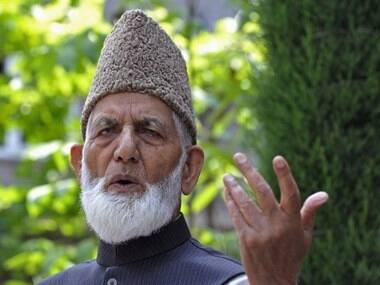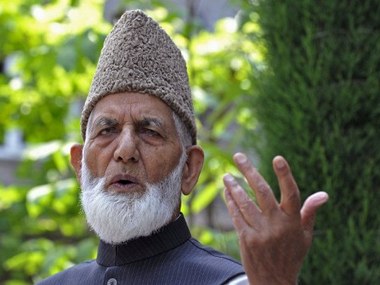When former Pakistan President Pervez Musharraf visited India in April 2005, he met with Kashmiri separatist leader Syed Ali Shah Geelani, as all visiting Pakistani leaders do, evidently to be seen to offering solidarity with the Kashmir cause. At that meeting, according to narratives of those present, Musharraf sought to persuade Geelani that the days of open support for Kashmiri separatism, backed by patronage of terrorists spawned by Pakistan’s ISI, were over. “The situation has changed, Geelani sahib,” Musharraf said. “We want you to be a part of the peace-building measures.” [caption id=“attachment_231866” align=“alignleft” width=“380” caption=“Chairman of the All Parties Hurriyat Conference (APHC), Syed Ali Shah Geelani. AFP”]
 [/caption] But having given over his life to the cause of Kashmiri separatism, a cause that seemed at risk of dying out, Geelani saw this as Pakistan’s betrayal of Kashmir. He then went on the offensive, questioning Musharraf over his support for the US since September 2001. An incensed Musharraf, a proud General who had himself done his damnedest to finger India over Kashmir and lost, resented Geelani’s criticism of Pakistan’s stand and told him off. Pakistan’s patronage of the Lashkar -e-Taiba and other terrorist groups, of course, continued long after that meeting, and continues to this day. But the event may have marked one milestone in Geelani’s progression from a man who worked a crowd to chant “Hum Pakistani hai, Pakistan hamara hai” (
watch the video here
) to a tired old man who now confronts the realisation that his azaadi dream, fostered by years of Pakistani support, is now dying. There is therefore a supreme irony about reports that Geelani faces a police investigation for having endorsed the Pakistan visa application of one of the three persons who were arrested on the charge that they were planning terrorist attacks in New Delhi. The police have alleged that the suspected terrorist underwent terrorism training in Pakistan. The best defence that Geelani’s aides can come up with is that he gives many recommendations for Kashmiris to secure Pakistani visas, and doesn’t always know what the visitors go there for – and to that extent Geelani cannot be held culpable for the other’s actions. But anyone who puts his signature down on any endorsement is staking his personal reputation, and for Geelani’s aides to claim otherwise – now that Geelani stands accused of supporting the visa application of a suspected terrorist - is pious baloney. Geelani’s frustration with Pakistan’s “abandonment” of the Kashmiri separatist cause – at least in official interlocutions – is manifesting itself in other ways. The man has in recent times taken to “advising” Pakistan not to crush the Balochi separatist movement, but instead talk to the leaders there. Even Pakistani leaders have woken up to the realisation that when one’s beard is on fire, it is folly to ask for a match to light one’s bidi. When Pakistan itself stands at grave risk of balkanisation, and when the terrorists that it spawned in Kashmir today pose an existential threat to the Pakistani state, the lust for Kashmir appears to have abated (although the ISI-military is still stirring the pot). But that rationale hasn’t yet dawned on Geelani. In recent times, and particularly over the winter months,
Geelani has been hibernating in New Delhi
, where he has been meeting mainstream political leaders and civil society representatives and thinktanks. Some observers see this as a “mellowing” of Geelani, although there is no compelling evidence of that. He is still lobbying diplomats in Delhi, and working to present his warped view of Indian “occupation” of Kashmir to whoever is willing to listen to his outpourings. But his increasingly vociferous criticism of Pakistan over Kashmir comes at a time when India’s relations with Pakistan have ironically been on the slow mend. Most recently, it found expression in the Pakistan government’s articulation of its resolve to grant Most Favoured Nation status to trade with India, a move that LeT leaders – and their masterminds in the ISI and the Pakistani military – oppose. The tortured history of India and Pakistan suggests that whenever bilateral relations between the two improve, the forces that oppose the normalisation process crawl out of the woodworks. The November 2008 terrorist outrage in Mumbai came during a process of normalisation. So, if things are on the mend, the red flags too should come out. Politicians like Mani Shankar Aiyar like to criticise those in India too that oppose the process of normalisation of relations with Pakistan –
and equate them with the Lashar-e-Taiba
. Yet, Aiyar cannot get himself to criticise the perverted politics of Geelani, who too resents the peaceable overtures between India and Pakistan on the ground that it amounts to a “betrayal” of the Kashmir cause. Over the decades, the Indian government may have played its cards all wrong in Kashmir, and the sense of alienation among Kashmiri people may be very real. But secessionists like Geelani have if anything made it worse for the Kashmiri people by their open embrace of Pakistan’s perfidious role in Kashmir. It’s good to know that Geelani no longer sees Pakistan as Kashmir’s “saviour”. But as contrition for his past follies, Geelani must, if he has truly mellowed down, go one step further. He should publicly acknowledge the death of his azaadi dream - and perhaps lead his followers to chant “Hum Hindustani hai, Hindustan hamara hai.” He owes that, at the very least, to the Kashmiri people he has misled all these decades.
[/caption] But having given over his life to the cause of Kashmiri separatism, a cause that seemed at risk of dying out, Geelani saw this as Pakistan’s betrayal of Kashmir. He then went on the offensive, questioning Musharraf over his support for the US since September 2001. An incensed Musharraf, a proud General who had himself done his damnedest to finger India over Kashmir and lost, resented Geelani’s criticism of Pakistan’s stand and told him off. Pakistan’s patronage of the Lashkar -e-Taiba and other terrorist groups, of course, continued long after that meeting, and continues to this day. But the event may have marked one milestone in Geelani’s progression from a man who worked a crowd to chant “Hum Pakistani hai, Pakistan hamara hai” (
watch the video here
) to a tired old man who now confronts the realisation that his azaadi dream, fostered by years of Pakistani support, is now dying. There is therefore a supreme irony about reports that Geelani faces a police investigation for having endorsed the Pakistan visa application of one of the three persons who were arrested on the charge that they were planning terrorist attacks in New Delhi. The police have alleged that the suspected terrorist underwent terrorism training in Pakistan. The best defence that Geelani’s aides can come up with is that he gives many recommendations for Kashmiris to secure Pakistani visas, and doesn’t always know what the visitors go there for – and to that extent Geelani cannot be held culpable for the other’s actions. But anyone who puts his signature down on any endorsement is staking his personal reputation, and for Geelani’s aides to claim otherwise – now that Geelani stands accused of supporting the visa application of a suspected terrorist - is pious baloney. Geelani’s frustration with Pakistan’s “abandonment” of the Kashmiri separatist cause – at least in official interlocutions – is manifesting itself in other ways. The man has in recent times taken to “advising” Pakistan not to crush the Balochi separatist movement, but instead talk to the leaders there. Even Pakistani leaders have woken up to the realisation that when one’s beard is on fire, it is folly to ask for a match to light one’s bidi. When Pakistan itself stands at grave risk of balkanisation, and when the terrorists that it spawned in Kashmir today pose an existential threat to the Pakistani state, the lust for Kashmir appears to have abated (although the ISI-military is still stirring the pot). But that rationale hasn’t yet dawned on Geelani. In recent times, and particularly over the winter months,
Geelani has been hibernating in New Delhi
, where he has been meeting mainstream political leaders and civil society representatives and thinktanks. Some observers see this as a “mellowing” of Geelani, although there is no compelling evidence of that. He is still lobbying diplomats in Delhi, and working to present his warped view of Indian “occupation” of Kashmir to whoever is willing to listen to his outpourings. But his increasingly vociferous criticism of Pakistan over Kashmir comes at a time when India’s relations with Pakistan have ironically been on the slow mend. Most recently, it found expression in the Pakistan government’s articulation of its resolve to grant Most Favoured Nation status to trade with India, a move that LeT leaders – and their masterminds in the ISI and the Pakistani military – oppose. The tortured history of India and Pakistan suggests that whenever bilateral relations between the two improve, the forces that oppose the normalisation process crawl out of the woodworks. The November 2008 terrorist outrage in Mumbai came during a process of normalisation. So, if things are on the mend, the red flags too should come out. Politicians like Mani Shankar Aiyar like to criticise those in India too that oppose the process of normalisation of relations with Pakistan –
and equate them with the Lashar-e-Taiba
. Yet, Aiyar cannot get himself to criticise the perverted politics of Geelani, who too resents the peaceable overtures between India and Pakistan on the ground that it amounts to a “betrayal” of the Kashmir cause. Over the decades, the Indian government may have played its cards all wrong in Kashmir, and the sense of alienation among Kashmiri people may be very real. But secessionists like Geelani have if anything made it worse for the Kashmiri people by their open embrace of Pakistan’s perfidious role in Kashmir. It’s good to know that Geelani no longer sees Pakistan as Kashmir’s “saviour”. But as contrition for his past follies, Geelani must, if he has truly mellowed down, go one step further. He should publicly acknowledge the death of his azaadi dream - and perhaps lead his followers to chant “Hum Hindustani hai, Hindustan hamara hai.” He owes that, at the very least, to the Kashmiri people he has misled all these decades.
Venky Vembu attained his first Fifteen Minutes of Fame in 1984, on the threshold of his career, when paparazzi pictures of him with Maneka Gandhi were splashed in the world media under the mischievous tag ‘International Affairs’. But that’s a story he’s saving up for his memoirs… Over 25 years, Venky worked in The Indian Express, Frontline newsmagazine, Outlook Money and DNA, before joining FirstPost ahead of its launch. Additionally, he has been published, at various times, in, among other publications, The Times of India, Hindustan Times, Outlook, and Outlook Traveller.
)